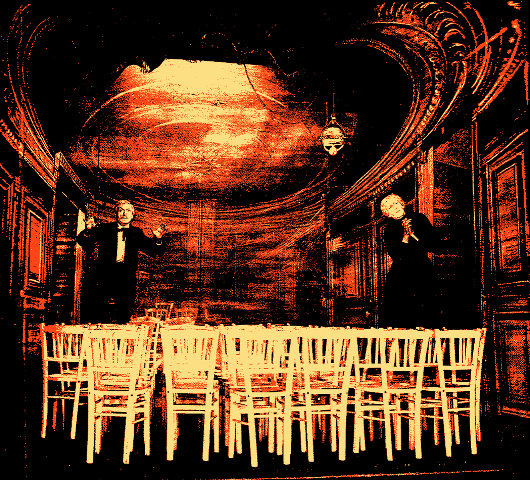Exploring Ionesco2 - Αυτοσχεδιάζοντας με ΚΑΡΕΚΛΕΣ

Γιατί Ιονέσκο; Και γιατί τις «ΚΑΡΕΚΛΕΣ»; Γιατί όχι μια ακόμα devised παράσταση; Γιατί μετά από την τελευταία παραγωγή της Play-full, το devised έργο "Labyrinthe" ένιωσα έντονα την ανάγκη να καταφύγω σε ένα κείμενο. Να μάθω κάποια βασικά εργαλεία δραματοποίησης – αφήγησης και όλα όσα μπορείς να μάθεις εξερευνώντας άλλα κείμενα, που είναι έτοιμα, δοκιμασμένα και στην περίπτωση του κυρίου Ιονέσκο ανοιχτά για να βυθιστείς όσο περισσότερο θες και μπορείς κάθε φορά.
Καρέκλες; Ναι, καρέκλες. Η επαφή ξεκίνησε από μια φωτογραφία (αυτή που συνοδεύει το κείμενο - από μια παράσταση του 1956 σε σκηνοθεσία Jaques Mauclair στο Theatre du Studio Champs Elysees, Παρίσι). Από τη σειρά "The Paris Review – Interviews" και το βιβλίο "Playwrights At Work". Ακολούθησε και μια συνέντευξη του συγγραφέα που συμπεριλαμβάνεται στο συγκεκριμένο βιβλίο. Ένα πολύ ενδιαφέρον βιβλίο που περιλαμβάνει συνεντεύξεις των Θόρντον Ουάϊλντερ, Άρθουρ Μίλλερ, Χάρολντ Πίντερ και άλλων και πολύ ιδιαίτερα αφιερώματα σε Μπέκεττ και Τέννεσσι Ουίλλιαμς. Θα παρουσιάσω δυο-τρία βασικά αποσπάσματα της συνέντευξης, τα οποία είναι και οι βασικοί λόγοι γιατί εξερευνώ τον κόσμο του κου Ιονέσκο και κατ’ επέκταση το έργο του «Οι Καρέκλες».
Παράθεση 1
Ionesco: For example, when someone is dying, women surround him and chant, "Be careful! Don’t tarry on the way! Don’t be afraid of the wolf; it is not a real wolf!" – exactly as in the Exit the King. They do that so the dead man won’t stay in infernal regions. The same thing can be found in The Tibetan Book of the Dead, which had a great impact on me too. However, my deepest anxieties were awakened, or reactivated, through Kafka.
Interviewer: Especially the Kafka of “The Metamorphosis”?
Ionesco: Yes, and of Amerika. Remember how his character, Karl Rossmann, goes from cabin to cabin and can’t find his way? It is very oneiric.
Παράθεση 2
Ionesco: Quite by chance, I met a man named Sainmont, who was a professor of philosophy and the founder, or Le Providateur général, of the Collège de ́Pataphysique. Later I met Raymond Queneau and Boris Vian, who were the most important and active members. The Collège was an enterprise dedicated to nihilism and irony, which in my view corresponded to Zen.
Παράθεση 3
Ionesco: But I put it in a play called This Extraordinary Brothel, in which the protagonist doesn’t talk at all. There is a revolution, everybody kills everybody else, and he doesn’t understand. But at the very end, he speaks almost for the first time. He points his finger towards the sky and shakes it at God, saying, “You rogue!” You little rogue!” and he bursts out laughing. He understands that the world is an enormous farce, a canular played by god against man, and that he has to play God’s game and laugh about it. That is why I prefer the phrase “theater of derision”, which Emmanuel Jacquart used for the title of his book on Beckett, Adamov, and myself, to “theater of the absurd”.
Παράθεση 4
Ionesco: In England, where people like Edward Bond write plays in which terrible things happen, it is still on the political level. The sacred and the ritual are missing. Did I tell you that I recently went to Taiwan? It is a nice American place, and everybody speaks English. But they seem to have lost touch completely with their own traditions, their own sages, and I, not a particularly erudite amateur, had to tell them about Confucius, Buddha, Zen.
Η αγάπη του Ιονέσκο για την Ανατολική φιλοσοφία και το Ζεν αποτελούν τα πρωταρχικά υλικά που θέλω να προσεγγίσω. Μήπως οι τεχνικές διαλογισμού (όπως και μουσικές που συνοδεύουν κάποιους), αλλά και η γενικότερη φιλοσοφία του Osho μπορούν να προστεθούν σε αυτή την αναζήτηση – σε αυτό το νέο ταξίδι;
Επίσης, οι καρέκλες που προστίθενται καθώς εξελίσσεται το έργο δεν δημιουργούν ένα μικρό λαβύρινθο για τους δυο κεντρικούς χαρακτήρες;
Ionesco: The story of my life is the story of a wandering.
Αν σε αυτή την αναζήτηση, τελικά δεν προκύψει μια παράσταση για τις Καρέκλες, αλλά ένα καινούριο έργο, επίσης, δεν είμαι σε θέση να το αποκλείσω στην παρούσα φάση.
Σχόλια
Δημοσίευση σχολίου